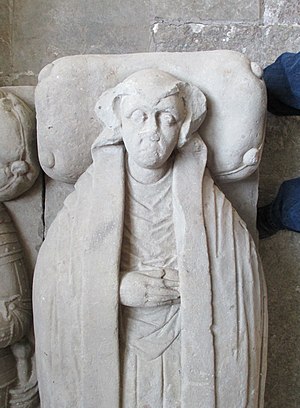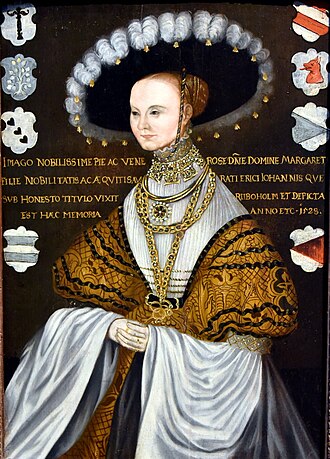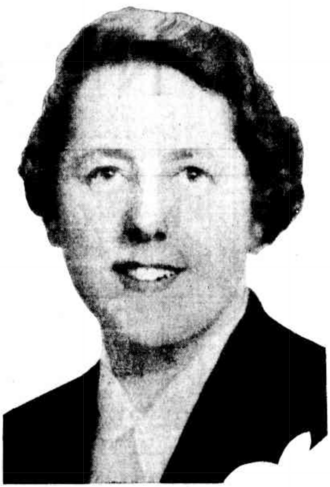Discover Your Roots
SIGN UPDiscover Your Roots
SIGN UPMargareta is a female given name of German origin, meaning "Pearl." It is widely used in German, Austrian, Romanian, Swedish, and other cultures. The name has Latin roots, derived from the Greek word "margaritari," which translates to "pearl" and was borrowed from the Persians. Margareta is cognate with similar names such as Margaret, Marguerite, and Margarita. Notable individuals with this name include Margareta of Romania, Maya Ackerman, Margareta Alströmer, and Margareta Kozuch. The name has historical significance and is associated with missionaries, artists, politicians, writers, and actresses. For further information, the name is linked to related pages such as "Greta (disambiguation)," "Margaret (disambiguation)," and "Margarita (disambiguation)."

Margareta Slots, also known as Margareta Cabiljau, was renowned as the royal mistress of King Gustav II Adolf of Sweden and the mother of his illegitimate son, Gustav of Vasaborg. Born to Dutch merchant Abraham Cabiljau and Maria van Leest, she met Gustav during the Ingrian War at the siege of Pskov in 1615. Despite being married to Dutch military engineer Andries Sessandes at the time, she bore Gustav's son, whom he acknowledged and supported. Following the deaths of her first two husbands, she married Jacob Trello and was granted the estate Benhamra in Uppland. Slots was known for seeking favors from the king and was involved in an incident in 1625 where she confronted a bailiff and was accused of his murder. Despite the accusations, no legal action was taken against her. Although she only met Gustav once after their relationship ended, her impact on Swedish history remains noteworthy.

Margareta Eriksdotter Vasa, also known as Margareta Vasa and Margareta of Hoya, was a prominent Swedish noblewoman and the sister of King Gustav I of Sweden. Born in 1497 to Erik Johansson Vasa and Cecilia Månsdotter, she demonstrated exceptional intellect and a keen interest in literature. In 1516, she married riksråd Joakim Brahe, but tragically, her spouse and father were executed in the Stockholm Bloodbath. Margareta and her family were subsequently imprisoned and subjected to harsh conditions in Denmark. Upon her release, she married German count John VII of Hoya and settled in Vyborg Castle, where she assumed command in her husband's absence. Despite her concerns about the Swedish Reformation and the dangers posed by the Russians, she remained in Finland at her brother's behest. Margareta's life was marked by political alliances, rebellion, and diplomatic missions, reflecting her active involvement in the political landscape of her time. Her resilience and contributions to her brother's reign have left a lasting legacy in Swedish history.

Margareta i Kumla, also known as the Sibyl of Kumla, was a Swedish visionary who claimed to be possessed and became the subject of pilgrimages when she professed to be the channel of the words of angels. She was born to Johannes Laurentii, the Vicar of Kumla, and in her teens, she claimed to have had visions of a white bird and a "black" man, likely referring to the Devil. Margareta's experiences included encounters with angels and high ranked devils, and she foretold the discontinuation of war in Poland through a miracle. Her visions and alleged encounters with demons and angels made her famous nationwide, attracting pilgrimages from across the country. However, her activities were eventually ordered to be stopped by King Gustavus Adolphus of Sweden, and all pilgrimages to her were discontinued. The visions of Margareta i Kumla were well-documented, with Bishop Laurentius Paulinus Gothus describing her experiences at a meeting of the Swedish clergy in 1629 and publishing them in 1642. Her story remains a significant part of Swedish history in the 17th century.

Margareta Elisabeth Roos, also known as Anna Stina Roos (1696–1772), was a Swedish woman who defied societal norms by cross-dressing and serving as a soldier in the Swedish army during the Great Northern War. Born the daughter of a Captain in Ingria, she enlisted in 1713 and displayed remarkable courage, earning a promotion to the rank of non-commissioned officer. Despite her "masculine" appearance and behavior, her true gender remained a secret until a maid discovered it during an illness. After leaving the army, she worked as a head butler and later married a fellow veteran of the war, with whom she had at least two children. Despite the unconfirmed nature of her military service, her story is well known and reflects a certain tolerance for women serving as soldiers, even within aristocratic circles. Margareta Elisabeth Roos' extraordinary life challenges traditional gender roles and serves as a testament to her bravery and resilience in the face of societal expectations.

Margareta Louise Pitcairn Webber (17 September 1891 - 6 May 1983) was a prominent book seller in Melbourne, Australia, renowned for her iconic bookstore, The Bookshop of Margareta Webber, which she operated for nearly 40 years. Despite the challenges posed by the great depression, Webber successfully expanded her business, offering an extensive collection of books from various publishers and creating a welcoming atmosphere with coffee, sherry, and personalized service for her customers. Notable Melbourne figures frequented her bookshop, and she was highly regarded in the community.Webber was also a founding member of The Soroptimist International Club of Victoria and was known for her longstanding companionship with Jean Littlejohn. Following her passing in 1983, a memorial celebrating her life with books was held at the Toorak Uniting Church. Throughout her life, Webber left a lasting impact on the literary and cultural landscape of Melbourne.Source:Original Famous People Content
All images displayed on this page are sourced from Wikipedia or Wikimedia Commons.We use these images under their respective Creative Commons or public domain licenses. Wherever applicable, author attributions and license information are provided. If you believe an image is used incorrectly or outside its license terms, please contact us so that we can review and correct the issue.